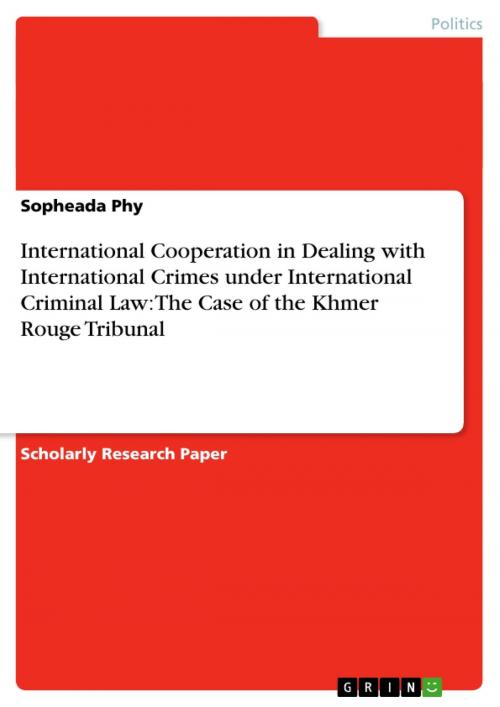International Cooperation in Dealing with International Crimes under International Criminal Law: The Case of the Khmer Rouge Tribunal
Nonfiction, Social & Cultural Studies, Political Science, International, International Security| Author: | Sopheada Phy | ISBN: | 9783640600458 |
| Publisher: | GRIN Publishing | Publication: | April 22, 2010 |
| Imprint: | GRIN Publishing | Language: | English |
| Author: | Sopheada Phy |
| ISBN: | 9783640600458 |
| Publisher: | GRIN Publishing |
| Publication: | April 22, 2010 |
| Imprint: | GRIN Publishing |
| Language: | English |
Research Paper (undergraduate) from the year 2009 in the subject Politics - International Politics - Topic: Peace and Conflict Studies, Security, grade: A, University for Peace (United Nations-mandated University for Peace), language: English, abstract: Traditional international law considered the sovereignty of state as the core principle and state cannot be interfered by other states or international community even though it is failed to protect its people. The modern international law developed when the Peace of Westphalia was signed in 1648. With this development, the principle of sovereignty of state has been gradually replaced with the principle of international community as every state more or less is dependent, particularly in terms of economics and politics, in order to survive in the world community. In this regard, each state came into agreement on trade, diplomacy and so on with the others. So each is bound by international law either treaty, customary international law, or other sources of international law. Regarding the international crimes under international criminal law such as genocide, crimes against humanity, and war crimes, most of the states more or less are bound by them, significantly under the 1948-Convention on the Prevention and Punishment of the Crime of Genocide, 1968-Convention on the Non-Applicability of Statutory Limitations to War Crimes and Crimes against Humanity, and the 2002-Rome Statute of the International Criminal Court (ICC). Throughout the history, a number of genocide, crimes against humanity and war crimes happened, but only were four ad hoc tribunals right away created to prosecute the criminals before the ICC came into being in 2002. Those are the 1945-Nuremberg Tribunal, the 1946- Tokyo Tribunal, the 1993-International Criminal Tribunal for the Former Yugoslavia, and the 1994-International Criminal Tribunal for Rwanda. However, such a thing was not undertaken in Cambodia after the Khmer Rouge regime collapse in 1979. The Khmer Rouge Tribunal is selected to study because it is the only tribunal established very late after the carelessness of the international community and the prolonged and often acrimonious cooperation and negotiation between the Cambodian government and the UN, unlike the others. [...]
Research Paper (undergraduate) from the year 2009 in the subject Politics - International Politics - Topic: Peace and Conflict Studies, Security, grade: A, University for Peace (United Nations-mandated University for Peace), language: English, abstract: Traditional international law considered the sovereignty of state as the core principle and state cannot be interfered by other states or international community even though it is failed to protect its people. The modern international law developed when the Peace of Westphalia was signed in 1648. With this development, the principle of sovereignty of state has been gradually replaced with the principle of international community as every state more or less is dependent, particularly in terms of economics and politics, in order to survive in the world community. In this regard, each state came into agreement on trade, diplomacy and so on with the others. So each is bound by international law either treaty, customary international law, or other sources of international law. Regarding the international crimes under international criminal law such as genocide, crimes against humanity, and war crimes, most of the states more or less are bound by them, significantly under the 1948-Convention on the Prevention and Punishment of the Crime of Genocide, 1968-Convention on the Non-Applicability of Statutory Limitations to War Crimes and Crimes against Humanity, and the 2002-Rome Statute of the International Criminal Court (ICC). Throughout the history, a number of genocide, crimes against humanity and war crimes happened, but only were four ad hoc tribunals right away created to prosecute the criminals before the ICC came into being in 2002. Those are the 1945-Nuremberg Tribunal, the 1946- Tokyo Tribunal, the 1993-International Criminal Tribunal for the Former Yugoslavia, and the 1994-International Criminal Tribunal for Rwanda. However, such a thing was not undertaken in Cambodia after the Khmer Rouge regime collapse in 1979. The Khmer Rouge Tribunal is selected to study because it is the only tribunal established very late after the carelessness of the international community and the prolonged and often acrimonious cooperation and negotiation between the Cambodian government and the UN, unlike the others. [...]















